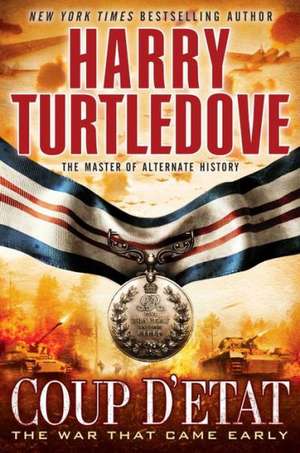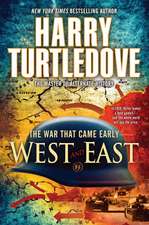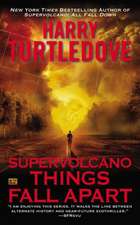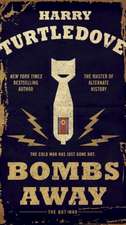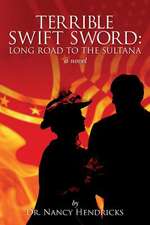Coup D'Etat
Autor Harry Turtledoveen Limba Engleză Paperback – 22 iul 2013
In Harry Turtledove’s mesmerizing alternate history of World War II, the choices of men and fate have changed history. Now it is the winter of 1941. As the Germans, with England and France on their side, slam deep into Russia, Stalin’s terrible machine fights for its life. But the agreements of world leaders do not touch the hearts of soldiers. The war between Germany and Russia is rocked by men with the courage to aim their guns in a new direction.
England is the first to be shaken. Following the suspicious death of Winston Churchill, with his staunch anti-Nazi views, a small cabal begins to imagine the unthinkable in a nation long famous for respecting the rule of law. With civil liberties hanging by a thread, a conspiracy forms against the powers that be. What will this daring plan mean for the European war as a whole?
Meanwhile, in America, a woman who has met Hitler face-to-face urges her countrymen to wake up to his evil. For the time being, the United States is fighting only Japan—and the war is not going as well as Washington would like. Can Roosevelt keep his grip on the country’s imagination?
Coup d’Etat captures how war makes for the strangest of bedfellows. A freethinking Frenchman fights side by side with racist Nazis. A Czech finds himself on the dusty front lines of the Spanish Civil War, gunning for Germany’s Nationalist allies. A German bomber pilot courts a half-Polish, half-Jewish beauty in Bialystock. And the Jews in Germany, though trapped under Hitler’s fist, are as yet protected by his fear of looking bad before the world—and by an outspoken Catholic bishop.
With his spectacular command of character, coincidence, and military and political strategies, Harry Turtledove continues a passionate, unmatched saga of a World War II composed of different enemies, different allies—and hurtling toward a horrific moment. For a diabolical new weapon is about to be unleashed, not by the United States, but by Japan, in a tactic that will shock the world.
Praise for Coup d’Etat
“Turtledove’s masterful presentation of an alternate WWII reaches its fourth volume with its quality undiminished. . . . A tribute to [his] commanding skills.”—Booklist (starred review)
“For lovers of alternative history, and particularly the very popular Turtledove with his appealing weaponry, battle tactics, and setting details, this story will satisfy. It sets out to entertain . . . and that it does.”—Historical Novels Review
“The book’s grand scope and Turtledove’s impressive historical knowledge are admirable.”—Kirkus Reviews
From the Hardcover edition.
Preț: 126.47 lei
Nou
Puncte Express: 190
Preț estimativ în valută:
24.20€ • 25.33$ • 20.14£
24.20€ • 25.33$ • 20.14£
Carte disponibilă
Livrare economică 10-24 martie
Preluare comenzi: 021 569.72.76
Specificații
ISBN-13: 9780345524669
ISBN-10: 0345524667
Pagini: 434
Dimensiuni: 155 x 233 x 24 mm
Greutate: 0.45 kg
Editura: Del Rey Books
ISBN-10: 0345524667
Pagini: 434
Dimensiuni: 155 x 233 x 24 mm
Greutate: 0.45 kg
Editura: Del Rey Books
Recenzii
“Turtledove’s masterful presentation of an alternate WWII reaches its fourth volume with its quality undiminished. . . . A tribute to [his] commanding skills.”—Booklist (starred review)
“For lovers of alternative history, and particularly the very popular Turtledove with his appealing weaponry, battle tactics, and setting details, this story will satisfy. It sets out to entertain . . . and that it does.”—Historical Novels Review
“The book’s grand scope and Turtledove’s impressive historical knowledge are admirable.”—Kirkus Reviews
From the Hardcover edition.
“For lovers of alternative history, and particularly the very popular Turtledove with his appealing weaponry, battle tactics, and setting details, this story will satisfy. It sets out to entertain . . . and that it does.”—Historical Novels Review
“The book’s grand scope and Turtledove’s impressive historical knowledge are admirable.”—Kirkus Reviews
From the Hardcover edition.
Notă biografică
Harry Turtledove is the award-winning author of the alternate-history works The Man with the Iron Heart, The Guns of the South, and How Few Remain (winner of the Sidewise Award for Best Novel); the War That Came Early novels: West and East, Hitler’s War, and The Big Switch; the Worldwar saga: In the Balance, Tilting the Balance, Upsetting the Balance, and Striking the Balance; the Colonization books: Second Contact, Down to Earth, and Aftershocks; the Great War epics: American Front, Walk in Hell, and Breakthroughs; the American Empire novels: Blood & Iron, The Center Cannot Hold, and Victorious Opposition; and the Settling Accounts series: Return Engagement, Drive to the East, The Grapple, and In at the Death. Turtledove is married to fellow novelist Laura Frankos. They have three daughters: Alison, Rachel, and Rebecca.
From the Hardcover edition.
From the Hardcover edition.
Extras
Chapter 1
Manila harbor was a mess. Pete McGill hadn’t expected it to be anything else. And the fierce Philippine sun beat down on him even though it was January. The past few years, he’d served in Peking and Shanghai. He was used to winter blowing straight down from Siberia. This muggy tropical heat, by contrast, seemed like too much of a good thing.
He still wasn’t as steady on his pins as he wished he were, either. The bomb in Shanghai that killed his ladylove came much too close to finishing him, too. The docs here did as good a job of patching him up as they could, and he’d had time to heal. All the same, an ankle ached and a shoulder twinged every time he took a step. His face was set in a permanent grimace, not least so nobody would notice him wincing and try to send him back to the hospital.
Or maybe no one would bother any which way. It looked to Pete as if they’d take anybody with a pulse right now. A fireboat played streams of water on a burning barge. Whatever was going up didn’t seem to care. Black, greasy, stinking smoke rose high into the sky.
That wasn’t the only fire burning around here, either—nowhere close. Pete coughed harder than he usually did after his first morning cigarette. Jap bombing raids had hit the airports and the harbor hard. Now the only question was when the slant-eyed little monkeys would try to land an invasion force. Pete was sure it wouldn’t be long.
Maybe all the smoke here would keep them from bombing accurately. Maybe . . .
“Out of the fucking way, Corporal, goddammit!” somebody bellowed behind Pete.
“Sorry.” He sidestepped as fast as he could, which wasn’t very. A petty officer went back to yelling at the Filipino gun crew manhandling an antiaircraft gun into place. The swab jockey must have served here for a while, because he was as fluently profane in Tagalog as he was in English.
Pete picked his way through the chaos toward the light cruiser Boise. The U.S. Asiatic Fleet wasn’t very big. This part of the world was too close to Japanese waters for the USA to risk much around here. Chances were that meant the Philippines would fall, something the Marine tried hard not to think about.
Bomb fragments scarred and dented the Boise’s metalwork, but she hadn’t taken any direct hits. If—no, when—Japanese planes came back . . . with luck, she wouldn’t be here. Exhaust from her funnels meant she could get going in a hurry. She could, and she probably would.
But she hadn’t yet. Mooring lines and a gangplank still tethered her to the wharf. Ignoring the pain in his leg, Pete strode up the gangplank and saluted the fresh-faced ensign standing at the far end of it. “Permission to come aboard, sir?” he asked the officer of the deck.
After returning the salute, the kid asked, “And you are . . . ?”
“Corporal Peter McGill, sir, reporting as ordered.”
The ensign checked the papers in the clipboard he carried in his left hand. “McGill . . . Yes, here you are.” He made a check mark with a mechanical pencil he pulled from his breast pocket. The United States might be at war, but that didn’t mean you didn’t have to dot every i and cross every t. Not yet it didn’t, anyhow. Once the sacred check mark went into place, the youngster unbent enough to add, “Permission granted.”
“Thank you, sir.” As soon as Pete set foot on the ship, he turned and saluted the Stars and Stripes at the stern. The flag fluttered in the warm, moist breeze.
“Dalrymple!” the ensign called. As if by magic, a tall, redheaded able seaman appeared beside him. “Take Corporal, uh, McGill to the Marines’ quarters. We’ll let them decide how best to use him.” As if catching himself at that, he asked Pete, “You can serve a five-inch gun, can’t you?”
“Oh, yes, sir,” Pete answered at once. Marines aboard battleships and cruisers often manned the big ships’ secondary armament. The Boise fought other ships with half a dozen long six-inch guns mounted in three turrets. The stubbier five-inchers and a variety of smaller, quick-firing weapons tried to keep planes off her.
When they weren’t serving the secondary armament, shipboard Marines also did duty as constables. Pete didn’t look forward to that. He wanted to fight Japs, not his own countrymen. Along with everything Hirohito’s bastards had done to him, he had Vera to pay them back for, too. A million slanties might be enough for that. Two would definitely be better, though.
“Come on with me, Corporal. I’ll show you where you can stow your duffel and all,” Dalrymple said.
“I’m coming,” Pete said. The sailor took long, quick steps. Keeping up with him made Pete’s ankle whimper, but he took no notice of it.
He knew about where he’d be going, but not exactly. He’d served aboard two destroyers and a battleship before going to Peking, but never a cruiser. Steps between decks might almost have been ladders: the treads were that narrow and steep. He managed to stay close to Dalrymple, anyhow.
Two corporals and two sergeants were playing pinochle in the cramped bunkroom to which the able seaman led him. They glanced up with no particular interest or liking. But one of the two-stripers looked vaguely familiar. “You’re Joe Orsatti, aren’t you?” Pete said.
“Yeah.” The other guy’s swarthy face scrunched up as he eyed Pete in a new way. “We were in the Brooks together, weren’t we? Sorry, Mac, but screw me if I remember your handle.” His New York City accent might have been even more clotted than Pete’s.
“McGill,” Pete said, and stuck out his hand. Orsatti reached for it. Their trial of strength was a push, or near enough. Pete chucked his duffel onto a top bunk. He wasn’t surprised to run into somebody with whom he’d served before. The Marines were a small club, and noncoms in the Corps a smaller one.
Orsatti introduced Pete to the other card players. They switched from pinochle to poker. Pete lost a little, won a little, lost a little more. He was down five bucks when the general-quarters klaxon hooted. He hadn’t heard that noise in years, but it still raised his hackles.
“What do I do? Where do I go?” he asked as they all sprang to their feet. “You guys are the only ones I’ve seen.”
“C’mon with me,” Orsatti said. “Our shell jerker’s got a bad back. I bet you can feed us ammo faster’n him.”
Pete hadn’t said anything about his own injuries. He didn’t say anything now, either. Instead, he followed Orsatti to a portside five-inch gun.
“Step aside, Jonesy,” Orsatti snapped to the private standing next to the ammunition hoist. “We got a new guy here who ain’t gonna keel over on us.”
“I’m okay, goddammit,” Jonesy said.
“Move,” Orsatti told him, and the other Marine moved. Such was the power of two stripes.
Pete grabbed a shell and handed it to the loader. How much did it weigh? Fifty pounds? Seventy-five? He wasn’t in anything like good hard shape. He’d have to do the best he could—that was all. He could hear planes overhead. The more they could knock down or scare off, the better.
The gun roared. The smaller antiaircraft guns were already stuttering out destruction. He seized the next shell and passed it on. Sweat was already springing out. Only dead men didn’t sweat like pigs in the Philippines.
A plane with big red meatballs on the wings and fuselage plummeted into the harbor, trailing smoke and fire. The blast as its bombs exploded staggered Pete; water they kicked up drenched him. And a glistening metal fragment tore out Jonesy’s throat. His cheers turned to horrible gobbling noises. He clutched at his neck with both hands, but blood sprayed and gushed all the same. His hands relaxed. He slumped to the deck. He couldn’t hope to live, not with his head half cut off.
More bombs whistled down. In spite of blast and whining, screeching fragments—in spite of almost literally being scared shitless—Pete went on feeding the five-inch gun. Maybe the intense antiaircraft fire from the Boise did scare off some Japs. Maybe the light cruiser was just lucky. Any which way, she picked up a few new dents and dings, but no more. Some of the other gun crews also had men down, wounded or as dead as Jonesy. All the same, she remained a going concern.
Her skipper decided it was time for her to get going, too. As soon as the Japanese bombers droned off to the west—back toward Jap-owned Formosa, Pete supposed—he ordered the lines cast off and the gangplank raised. Then he took her out of the harbor as fast as she would go. Nobody aboard had a bad word or, Pete was sure, a bad thought about that. If she stayed where she was, odds were she wouldn’t stay lucky a third time. All the old boring jokes about sitting ducks applied.
And Pete had more new buddies than Joe Orsatti. Go through a fight with a gun crew and you were all pals if you survived it. Jonesy—his first name was Elijah—went into the Pacific shrouded in cloth and weighed down by shell casings, along with half a dozen other dead men. The Boise raced south at upwards of thirty knots, looking for . . . Pete didn’t exactly know what. Whatever it proved to be, he hoped he’d come out the other side again.
January 20, 1941, was a miserable, frigid day in Philadelphia. Sleet made the roads anywhere from dangerous to impossible. Ice clung to power lines, too, and its weight brought some of them down. Peggy Druce wouldn’t have wanted to be without electricity in this weather. If you didn’t use coal, if you had an oil-fired furnace that depended on a pump, losing power meant that before long you’d start chopping up your furniture and burning it so you didn’t freeze to death.
Washington lay less than a hundred miles south, but it was conveniently on the other side of the cold front. Lowell Thomas assured his nationwide radio audience that it was in the forties, with clouds moving in front of the sun every now and then but no rain and certainly no sleet. Peggy, who hadn’t seen the sun since last Friday, was bright green with envy.
“We are here on this historic occasion to observe the third inauguration of President Roosevelt,” Thomas said in his ringing, sonorous tones. “This is, of course, the first time in the history of the United States that a President will be inaugurated for a third term. And, with the nation plunged into war little more than a week ago through the Empire of Japan’s unprovoked attacks on Hawaii and the Philippines, the President surely has a lot on his mind.”
Peggy wished Herb were sitting there beside her listening to the ceremony, too. Things weren’t so easy between them as they had been before she got back from Europe. She wished like hell some of what had happened there hadn’t happened. Those wishes did as much, or as little, good as ever. Still, she would have enjoyed what were sure to be his sarcastic comments about the ceremony farther south.
But her husband had taken the Packard in to his law office regardless of the slick, icy roads. He hadn’t called with tales of accidents, and neither had the police or a hospital, so Peggy supposed he’d made it downtown in one piece.
He was bound to have the radio on if he wasn’t with a client, and maybe if he was. Herb was always somebody who kept up with the news. Till Peggy got stuck in war-torn Europe, she’d wondered whether that had any point. She didn’t any more.
Lowell Thomas dropped his voice a little: “Ladies and gentlemen, Chief Justice Hughes will administer the oath of office to President Roosevelt. With his robes and his white beard, the Chief Justice looks most distinguished, most distinguished indeed. He also gave the President the oath at his two previous inaugurations.”
Only a few old men wore beards in these modern times. Well, Charles Evans Hughes was pushing eighty. He’d probably grown his before the turn of the century, decided he liked it, and kept it ever since. He’d come as close as a bad Republican turnout in California to unseating Woodrow Wilson in 1916. The world would be a different place if he had. Peggy wasn’t sure how, but she was sure it would be.
“Are you ready to take the oath, Mr. President?” Hughes sounded younger than he was, even if rumor said he would step down from the Court before too long.
“I am, Mr. Chief Justice.” No one who’d ever heard FDR’s jaunty voice could mistake it.
“Repeat after me, then,” Hughes said.
And the President—the third-term President—did: “I, Franklin Delano Roosevelt, do solemnly swear that I will faithfully execute the Office of President of the United States, and will to the best of my Ability, preserve, protect and defend the Constitution of the United States.”
“Congratulations, Mr. President,” the Chief Justice said.
“They are shaking hands,” Lowell Thomas said quietly.
In the background, applause rose like the sound of surging surf. “Thank you very much,” Roosevelt said, and then again, a moment later, “Thank you.”
“He is holding up his hands to still the clapping,” Thomas noted. But the clapping didn’t want to still. Back in 1933, FDR’d said we had nothing to fear but fear itself. Well, we had other things to fear now, starting with Japanese planes and carriers and battleships and soldiers.
“Thank you,” Roosevelt said once more. Slowly, the applause ebbed. Very slowly: it was as if people didn’t want the President to go on, because if he did they would have to look out across the sea at the big, dangerous world. Into something approaching quiet, FDR continued, “Believe me, I do thank you, from the bottom of my heart. What greater honor can any man claim than the continued confidence of the American people?”
That drew more applause and cheers. Now, though, they quickly died away. “I am going to tell you the plain truth,” Roosevelt said, “and the plain truth is, things could be better. When I ran for reelection promising not to send American boys off to fight in a foreign war, I meant every word of it.”
Peggy coughed as she inhaled cigarette smoke. Nobody in the United States played a deeper political game than FDR. When he started going on about what a plain, simple fellow he was, that was the time to hold on to your wallet.
“But we have had war delivered to us no matter how little we want it.” The President let anger rise in his voice. “And our freedom is threatened not only in the Far East. Whoever wins the great European struggle, liberty will be the loser.”
He was bound to be right about that. Whether Hitler beat Stalin or the other way around, the winner would be big trouble for the rest of the world. Right now, with France and England trailing along in his wake because he’d pulled German troops out of France, the Nazi seemed to have the edge on the Red. But there could be more big switches after the one Daladier and Chamberlain had pulled. Nobody would know under which shell the pea lurked till all the sliding around stopped.
Some people suspected Roosevelt’s intentions, too. “No European war!” a man yelled, loud enough for Lowell Thomas’ microphone to pick it up.
Hitler hadn’t declared war on the United States. If he did, it would hurt his palsy-walsy relationship with the last two surviving Western European democracies. It wouldn’t do the Third Reich any good, either. Peggy’d spent much more time in Nazi Germany than she ever wanted. The Germans didn’t understand how strong the USA could be. But even the Führer seemed to want to take things one step at a time.
“I do not intend to get us involved in a European war,” Roosevelt said firmly—so firmly, in fact, that Peggy got that wallet-clutching urge again. Did that yell come from a shill? Then the President proceeded to hedge: “I did not intend to get us involved in war against Japan, either. The only things I know for certain now are that the road ahead will be long and hard and dangerous, and that the United States of America will emerge triumphant at the end of that road.”
He got another hand then. Peggy remembered that, back in the days of ancient Rome, people used to keep track of how many times the Senate applauded the Emperor when he addressed it. She didn’t know how she knew that, but she did. Maybe Herb told her once upon a time—they’d rammed a big dose of Latin down his throat in high school and college. Somebody needed to keep track of the ovations in Washington today.
“We are going to become the arsenal of democracy, as I said in my Fireside Chat not long ago,” the President continued. “We must be strong enough to defeat the enemy in the Far East and to ensure that no enemy anywhere in the world can possibly defeat us.”
Yet again, people clapped and cheered. How many of those people had the faintest idea what war was like? Oh, some of the men would have gone Over There a generation before. They’d seen the elephant, as their grandfathers would have said in Civil War days. Most of FDR’s audience, though, didn’t really have any idea of what he was talking about.
Peggy did. She’d watched the Nazis storm into Czechoslovakia and promptly start tormenting Jews. She’d watched them march off freighters and into Copenhagen, ruining her chances to get back to the States for a while. She’d huddled against their bombs—and, while she was stuck in Germany, against English bombs, too, and maybe even against French and Russian bombs as well.
So she knew as much about what war was like these days as anyone who hadn’t carried a rifle could. Some people cheering Roosevelt would find out just that way. And others would learn when young men they loved came back maimed or didn’t come back at all. Would they still be cheering then?
The truly scary thing was, all the anguish and agony Roosevelt wouldn’t talk about in an inaugural address were going to be needed. The horror Peggy had seen and gone through in Europe made her much too sure of that.
Manila harbor was a mess. Pete McGill hadn’t expected it to be anything else. And the fierce Philippine sun beat down on him even though it was January. The past few years, he’d served in Peking and Shanghai. He was used to winter blowing straight down from Siberia. This muggy tropical heat, by contrast, seemed like too much of a good thing.
He still wasn’t as steady on his pins as he wished he were, either. The bomb in Shanghai that killed his ladylove came much too close to finishing him, too. The docs here did as good a job of patching him up as they could, and he’d had time to heal. All the same, an ankle ached and a shoulder twinged every time he took a step. His face was set in a permanent grimace, not least so nobody would notice him wincing and try to send him back to the hospital.
Or maybe no one would bother any which way. It looked to Pete as if they’d take anybody with a pulse right now. A fireboat played streams of water on a burning barge. Whatever was going up didn’t seem to care. Black, greasy, stinking smoke rose high into the sky.
That wasn’t the only fire burning around here, either—nowhere close. Pete coughed harder than he usually did after his first morning cigarette. Jap bombing raids had hit the airports and the harbor hard. Now the only question was when the slant-eyed little monkeys would try to land an invasion force. Pete was sure it wouldn’t be long.
Maybe all the smoke here would keep them from bombing accurately. Maybe . . .
“Out of the fucking way, Corporal, goddammit!” somebody bellowed behind Pete.
“Sorry.” He sidestepped as fast as he could, which wasn’t very. A petty officer went back to yelling at the Filipino gun crew manhandling an antiaircraft gun into place. The swab jockey must have served here for a while, because he was as fluently profane in Tagalog as he was in English.
Pete picked his way through the chaos toward the light cruiser Boise. The U.S. Asiatic Fleet wasn’t very big. This part of the world was too close to Japanese waters for the USA to risk much around here. Chances were that meant the Philippines would fall, something the Marine tried hard not to think about.
Bomb fragments scarred and dented the Boise’s metalwork, but she hadn’t taken any direct hits. If—no, when—Japanese planes came back . . . with luck, she wouldn’t be here. Exhaust from her funnels meant she could get going in a hurry. She could, and she probably would.
But she hadn’t yet. Mooring lines and a gangplank still tethered her to the wharf. Ignoring the pain in his leg, Pete strode up the gangplank and saluted the fresh-faced ensign standing at the far end of it. “Permission to come aboard, sir?” he asked the officer of the deck.
After returning the salute, the kid asked, “And you are . . . ?”
“Corporal Peter McGill, sir, reporting as ordered.”
The ensign checked the papers in the clipboard he carried in his left hand. “McGill . . . Yes, here you are.” He made a check mark with a mechanical pencil he pulled from his breast pocket. The United States might be at war, but that didn’t mean you didn’t have to dot every i and cross every t. Not yet it didn’t, anyhow. Once the sacred check mark went into place, the youngster unbent enough to add, “Permission granted.”
“Thank you, sir.” As soon as Pete set foot on the ship, he turned and saluted the Stars and Stripes at the stern. The flag fluttered in the warm, moist breeze.
“Dalrymple!” the ensign called. As if by magic, a tall, redheaded able seaman appeared beside him. “Take Corporal, uh, McGill to the Marines’ quarters. We’ll let them decide how best to use him.” As if catching himself at that, he asked Pete, “You can serve a five-inch gun, can’t you?”
“Oh, yes, sir,” Pete answered at once. Marines aboard battleships and cruisers often manned the big ships’ secondary armament. The Boise fought other ships with half a dozen long six-inch guns mounted in three turrets. The stubbier five-inchers and a variety of smaller, quick-firing weapons tried to keep planes off her.
When they weren’t serving the secondary armament, shipboard Marines also did duty as constables. Pete didn’t look forward to that. He wanted to fight Japs, not his own countrymen. Along with everything Hirohito’s bastards had done to him, he had Vera to pay them back for, too. A million slanties might be enough for that. Two would definitely be better, though.
“Come on with me, Corporal. I’ll show you where you can stow your duffel and all,” Dalrymple said.
“I’m coming,” Pete said. The sailor took long, quick steps. Keeping up with him made Pete’s ankle whimper, but he took no notice of it.
He knew about where he’d be going, but not exactly. He’d served aboard two destroyers and a battleship before going to Peking, but never a cruiser. Steps between decks might almost have been ladders: the treads were that narrow and steep. He managed to stay close to Dalrymple, anyhow.
Two corporals and two sergeants were playing pinochle in the cramped bunkroom to which the able seaman led him. They glanced up with no particular interest or liking. But one of the two-stripers looked vaguely familiar. “You’re Joe Orsatti, aren’t you?” Pete said.
“Yeah.” The other guy’s swarthy face scrunched up as he eyed Pete in a new way. “We were in the Brooks together, weren’t we? Sorry, Mac, but screw me if I remember your handle.” His New York City accent might have been even more clotted than Pete’s.
“McGill,” Pete said, and stuck out his hand. Orsatti reached for it. Their trial of strength was a push, or near enough. Pete chucked his duffel onto a top bunk. He wasn’t surprised to run into somebody with whom he’d served before. The Marines were a small club, and noncoms in the Corps a smaller one.
Orsatti introduced Pete to the other card players. They switched from pinochle to poker. Pete lost a little, won a little, lost a little more. He was down five bucks when the general-quarters klaxon hooted. He hadn’t heard that noise in years, but it still raised his hackles.
“What do I do? Where do I go?” he asked as they all sprang to their feet. “You guys are the only ones I’ve seen.”
“C’mon with me,” Orsatti said. “Our shell jerker’s got a bad back. I bet you can feed us ammo faster’n him.”
Pete hadn’t said anything about his own injuries. He didn’t say anything now, either. Instead, he followed Orsatti to a portside five-inch gun.
“Step aside, Jonesy,” Orsatti snapped to the private standing next to the ammunition hoist. “We got a new guy here who ain’t gonna keel over on us.”
“I’m okay, goddammit,” Jonesy said.
“Move,” Orsatti told him, and the other Marine moved. Such was the power of two stripes.
Pete grabbed a shell and handed it to the loader. How much did it weigh? Fifty pounds? Seventy-five? He wasn’t in anything like good hard shape. He’d have to do the best he could—that was all. He could hear planes overhead. The more they could knock down or scare off, the better.
The gun roared. The smaller antiaircraft guns were already stuttering out destruction. He seized the next shell and passed it on. Sweat was already springing out. Only dead men didn’t sweat like pigs in the Philippines.
A plane with big red meatballs on the wings and fuselage plummeted into the harbor, trailing smoke and fire. The blast as its bombs exploded staggered Pete; water they kicked up drenched him. And a glistening metal fragment tore out Jonesy’s throat. His cheers turned to horrible gobbling noises. He clutched at his neck with both hands, but blood sprayed and gushed all the same. His hands relaxed. He slumped to the deck. He couldn’t hope to live, not with his head half cut off.
More bombs whistled down. In spite of blast and whining, screeching fragments—in spite of almost literally being scared shitless—Pete went on feeding the five-inch gun. Maybe the intense antiaircraft fire from the Boise did scare off some Japs. Maybe the light cruiser was just lucky. Any which way, she picked up a few new dents and dings, but no more. Some of the other gun crews also had men down, wounded or as dead as Jonesy. All the same, she remained a going concern.
Her skipper decided it was time for her to get going, too. As soon as the Japanese bombers droned off to the west—back toward Jap-owned Formosa, Pete supposed—he ordered the lines cast off and the gangplank raised. Then he took her out of the harbor as fast as she would go. Nobody aboard had a bad word or, Pete was sure, a bad thought about that. If she stayed where she was, odds were she wouldn’t stay lucky a third time. All the old boring jokes about sitting ducks applied.
And Pete had more new buddies than Joe Orsatti. Go through a fight with a gun crew and you were all pals if you survived it. Jonesy—his first name was Elijah—went into the Pacific shrouded in cloth and weighed down by shell casings, along with half a dozen other dead men. The Boise raced south at upwards of thirty knots, looking for . . . Pete didn’t exactly know what. Whatever it proved to be, he hoped he’d come out the other side again.
January 20, 1941, was a miserable, frigid day in Philadelphia. Sleet made the roads anywhere from dangerous to impossible. Ice clung to power lines, too, and its weight brought some of them down. Peggy Druce wouldn’t have wanted to be without electricity in this weather. If you didn’t use coal, if you had an oil-fired furnace that depended on a pump, losing power meant that before long you’d start chopping up your furniture and burning it so you didn’t freeze to death.
Washington lay less than a hundred miles south, but it was conveniently on the other side of the cold front. Lowell Thomas assured his nationwide radio audience that it was in the forties, with clouds moving in front of the sun every now and then but no rain and certainly no sleet. Peggy, who hadn’t seen the sun since last Friday, was bright green with envy.
“We are here on this historic occasion to observe the third inauguration of President Roosevelt,” Thomas said in his ringing, sonorous tones. “This is, of course, the first time in the history of the United States that a President will be inaugurated for a third term. And, with the nation plunged into war little more than a week ago through the Empire of Japan’s unprovoked attacks on Hawaii and the Philippines, the President surely has a lot on his mind.”
Peggy wished Herb were sitting there beside her listening to the ceremony, too. Things weren’t so easy between them as they had been before she got back from Europe. She wished like hell some of what had happened there hadn’t happened. Those wishes did as much, or as little, good as ever. Still, she would have enjoyed what were sure to be his sarcastic comments about the ceremony farther south.
But her husband had taken the Packard in to his law office regardless of the slick, icy roads. He hadn’t called with tales of accidents, and neither had the police or a hospital, so Peggy supposed he’d made it downtown in one piece.
He was bound to have the radio on if he wasn’t with a client, and maybe if he was. Herb was always somebody who kept up with the news. Till Peggy got stuck in war-torn Europe, she’d wondered whether that had any point. She didn’t any more.
Lowell Thomas dropped his voice a little: “Ladies and gentlemen, Chief Justice Hughes will administer the oath of office to President Roosevelt. With his robes and his white beard, the Chief Justice looks most distinguished, most distinguished indeed. He also gave the President the oath at his two previous inaugurations.”
Only a few old men wore beards in these modern times. Well, Charles Evans Hughes was pushing eighty. He’d probably grown his before the turn of the century, decided he liked it, and kept it ever since. He’d come as close as a bad Republican turnout in California to unseating Woodrow Wilson in 1916. The world would be a different place if he had. Peggy wasn’t sure how, but she was sure it would be.
“Are you ready to take the oath, Mr. President?” Hughes sounded younger than he was, even if rumor said he would step down from the Court before too long.
“I am, Mr. Chief Justice.” No one who’d ever heard FDR’s jaunty voice could mistake it.
“Repeat after me, then,” Hughes said.
And the President—the third-term President—did: “I, Franklin Delano Roosevelt, do solemnly swear that I will faithfully execute the Office of President of the United States, and will to the best of my Ability, preserve, protect and defend the Constitution of the United States.”
“Congratulations, Mr. President,” the Chief Justice said.
“They are shaking hands,” Lowell Thomas said quietly.
In the background, applause rose like the sound of surging surf. “Thank you very much,” Roosevelt said, and then again, a moment later, “Thank you.”
“He is holding up his hands to still the clapping,” Thomas noted. But the clapping didn’t want to still. Back in 1933, FDR’d said we had nothing to fear but fear itself. Well, we had other things to fear now, starting with Japanese planes and carriers and battleships and soldiers.
“Thank you,” Roosevelt said once more. Slowly, the applause ebbed. Very slowly: it was as if people didn’t want the President to go on, because if he did they would have to look out across the sea at the big, dangerous world. Into something approaching quiet, FDR continued, “Believe me, I do thank you, from the bottom of my heart. What greater honor can any man claim than the continued confidence of the American people?”
That drew more applause and cheers. Now, though, they quickly died away. “I am going to tell you the plain truth,” Roosevelt said, “and the plain truth is, things could be better. When I ran for reelection promising not to send American boys off to fight in a foreign war, I meant every word of it.”
Peggy coughed as she inhaled cigarette smoke. Nobody in the United States played a deeper political game than FDR. When he started going on about what a plain, simple fellow he was, that was the time to hold on to your wallet.
“But we have had war delivered to us no matter how little we want it.” The President let anger rise in his voice. “And our freedom is threatened not only in the Far East. Whoever wins the great European struggle, liberty will be the loser.”
He was bound to be right about that. Whether Hitler beat Stalin or the other way around, the winner would be big trouble for the rest of the world. Right now, with France and England trailing along in his wake because he’d pulled German troops out of France, the Nazi seemed to have the edge on the Red. But there could be more big switches after the one Daladier and Chamberlain had pulled. Nobody would know under which shell the pea lurked till all the sliding around stopped.
Some people suspected Roosevelt’s intentions, too. “No European war!” a man yelled, loud enough for Lowell Thomas’ microphone to pick it up.
Hitler hadn’t declared war on the United States. If he did, it would hurt his palsy-walsy relationship with the last two surviving Western European democracies. It wouldn’t do the Third Reich any good, either. Peggy’d spent much more time in Nazi Germany than she ever wanted. The Germans didn’t understand how strong the USA could be. But even the Führer seemed to want to take things one step at a time.
“I do not intend to get us involved in a European war,” Roosevelt said firmly—so firmly, in fact, that Peggy got that wallet-clutching urge again. Did that yell come from a shill? Then the President proceeded to hedge: “I did not intend to get us involved in war against Japan, either. The only things I know for certain now are that the road ahead will be long and hard and dangerous, and that the United States of America will emerge triumphant at the end of that road.”
He got another hand then. Peggy remembered that, back in the days of ancient Rome, people used to keep track of how many times the Senate applauded the Emperor when he addressed it. She didn’t know how she knew that, but she did. Maybe Herb told her once upon a time—they’d rammed a big dose of Latin down his throat in high school and college. Somebody needed to keep track of the ovations in Washington today.
“We are going to become the arsenal of democracy, as I said in my Fireside Chat not long ago,” the President continued. “We must be strong enough to defeat the enemy in the Far East and to ensure that no enemy anywhere in the world can possibly defeat us.”
Yet again, people clapped and cheered. How many of those people had the faintest idea what war was like? Oh, some of the men would have gone Over There a generation before. They’d seen the elephant, as their grandfathers would have said in Civil War days. Most of FDR’s audience, though, didn’t really have any idea of what he was talking about.
Peggy did. She’d watched the Nazis storm into Czechoslovakia and promptly start tormenting Jews. She’d watched them march off freighters and into Copenhagen, ruining her chances to get back to the States for a while. She’d huddled against their bombs—and, while she was stuck in Germany, against English bombs, too, and maybe even against French and Russian bombs as well.
So she knew as much about what war was like these days as anyone who hadn’t carried a rifle could. Some people cheering Roosevelt would find out just that way. And others would learn when young men they loved came back maimed or didn’t come back at all. Would they still be cheering then?
The truly scary thing was, all the anguish and agony Roosevelt wouldn’t talk about in an inaugural address were going to be needed. The horror Peggy had seen and gone through in Europe made her much too sure of that.
